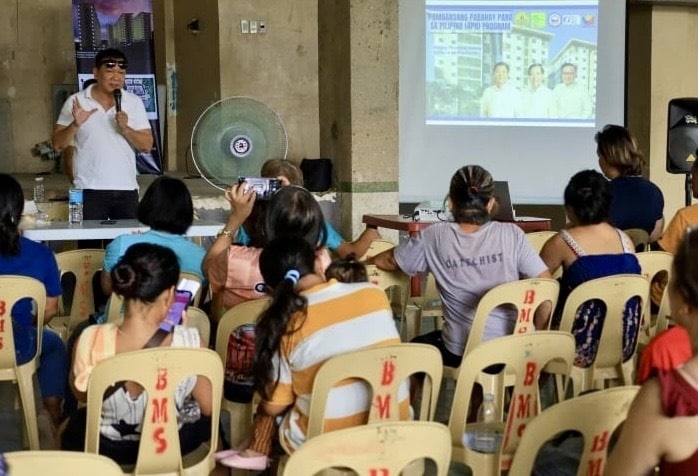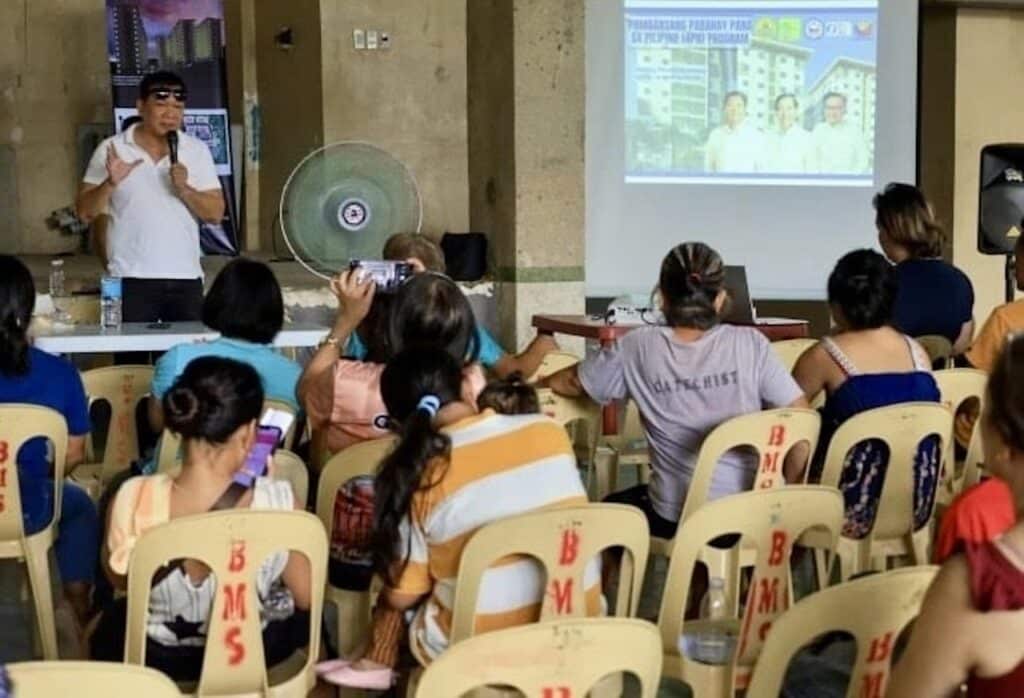
Councilor Jerry Guardo (standing), the newly-appointed overseer for housing concerns, talks to potential beneficiaries of the Pambansang Pabahay Para sa Pilipino (4Ph) program during an orientation on June 4, 2024. | Photo from Mayor Raymond Alvin Garcia/Facebook
CEBU CITY, Philippines — The Division for the Welfare of the Urban Poor (DWUP) clarified that some professionals residing in Cebu City’s socialized housing sites are ‘legitimate’ beneficiaries, not unqualified settlers, as previously alleged.
DWUP executive director Ronald Anthony Librando addressed the controversy on October 11, following the privilege speech made by City Councilor Rey Gealon that professionals, including an engineer, were living in housing sites meant for the underprivileged.
Gealon had called for an investigation, alleging that these individuals were receiving homes intended for poor families.
“It has come to my attention that some individuals who do not qualify for this program, such as an engineer and other professionals, are about to be awarded lots, taking away opportunities from those who truly deserve a decent place to call home,” Gealon said in a privilege speech on October 9.
READ MORE:
Probe into ‘unqualified’ beneficiaries in Cebu City’s socialized housing sought
Cebu City plans to bid out 400 transitional housing by September
Cebu urban poor group opposes Marcos’ high-rise housing project
However, Librando said that the professionals in question were government employees, primarily from City Hall and other national agencies, entitled to live in designated housing sites.
“Tinuod nga naa gyu’y mga dagko (nga balay) kay naa man ni sa mga housing sites intended for government workers, particularly for City Hall executives and those working for national government agencies,” Librando said.
(It is true. that there are big (houses) because this is in the housing sites intended for government workers, particularly for City Hall Executives and those working for national government agencies.)
He said that these employees were not subject to the beneficiary screening outlined in City Ordinance 1969, which would set guidelines for selecting beneficiaries of the city’s socialized housing program.
“Wala ni sila nag-agi kay benefit man ni nila as City Hall and government employees,” Librando said.
(They did not pass there because this is their benefit as city hall and government employees.)
He said that their occupancy was part of the benefits they received as government workers.
Librando also said that the housing sites located in Barangays Busay, Kasambagan, and Bulacao, intended for government employees, would also accommodate urban poor families who had undergone proper screening.
He acknowledged the dual-purpose use of these sites.
READ MORE: Affordable housing still a dream
“Mao sad nay problema kay naa’y mga housing site for government employees pero naa sad siya’y mga relocatees sad,” he added.
(That is the problem because there are housing sites for government employees but there are also for the relocatees.)
Meanwhile, Librando revealed that DWUP is preparing to file charges against a former official of the city’s Slum Improvement and Resettlement (SIR) program for refusing to turn over critical documents related to the program.
The official, whose name is being withheld, did not comply with orders to transfer documents related to 1,800 SIR beneficiaries in Pasil, Suba, Sawang Calero, and Sitio Alaska, Mambaling.
The missing documents, including ledgers, balance sheets, subdivision plans, and receipts, have been under the former official’s custody. Despite repeated requests, the official failed to turn them over and has since applied for retirement.
“Mao na among sunod nga move. We will initiate legal moves aning iyang gibuhat nga wala gyu’y proper turnover,” Librando said.
The SIR program, which was merged with DWUP in 2013, aims to improve living conditions in Cebu City’s slum areas, and the missing documents are crucial for assessing the status of beneficiary payments.
